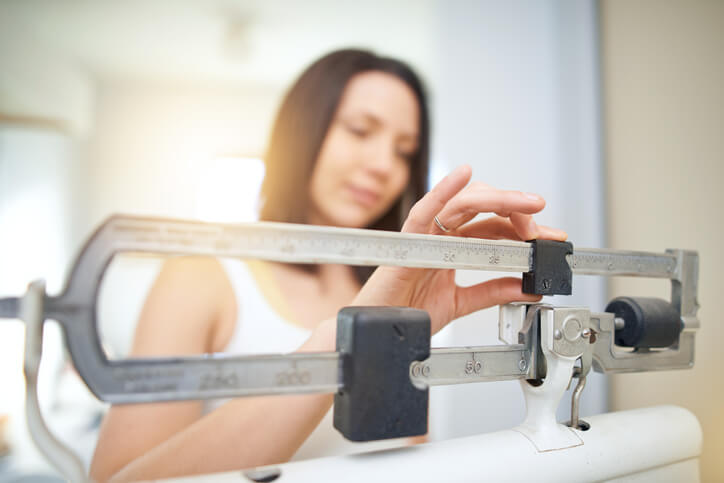
8 Questions to Ask Yourself When Setting a Weight Loss Goal
[cs_content][cs_section bg_color=”hsl(0, 0%, 100%)” parallax=”false” separator_top_type=”none” separator_top_height=”50px” separator_top_angle_point=”50″ separator_bottom_type=”none” separator_bottom_height=”50px” separator_bottom_angle_point=”50″ style=”margin: 0px;padding: 45px 0px;”][cs_row inner_container=”true” marginless_columns=”false” style=”margin: 0px auto;padding: 0px;”][cs_column fade=”false” fade_animation=”in” fade_animation_offset=”45px” fade_duration=”750″ type=”2/3″ style=”padding: 0px;”][x_custom_headline level=”h1″ looks_like=”h1″ accent=”false”]8 Questions to Ask Yourself When Setting a Weight Loss Goal[/x_custom_headline][cs_text]Reviewed & Approved by Dr. Larry
[dropcap]I[/dropcap]magine if you had a bow and arrow and were just standing with a forest in front of you, without a specific target. You could randomly start shooting arrows, and you might hit something — a tree, probably the ground, hopefully not a fellow archer. Chances that you are going to hit the bulls-eye? Close to zero, I’d say. Without aiming at a specific target or goal, you are unlikely to get what you want.
One of the most important — and often overlooked — steps to losing weight is setting good goals to direct our behavior. Like an archer without a target, it is much more difficult to meet your weight loss goals if you don’t have a clear idea of what those goals are.
So what makes a good goal? In The Gentleman’s Diet, we address eight criteria for a good goal: the SMART+3 formula.
Setting SMART Weight Loss Goals
Most of us are familiar with the SMART acronym, the classic tool for checking goals to make sure they are appropriate. As you set your weight loss goals, ask yourself whether it meets the following SMART criteria:
- Is it specific? Good goals are focused and well-defined. Example: I want to look better vs. I want to have washboard abs.
- Is it measurable? A good goal is quantifiable, meaning you can put a number to it. Example: I’d like a slim waist vs. My goal is a waist less than 35 inches.
- Is it attainable? Good goals are realistic. Example: I want to lose 150 pounds vs. My realistic goal is to start off with a five-pound weight loss.
- Is it relevant? A good goal is worthwhile and aligned with what you truly want — better health and life. Example: I want great hair vs. I aim to run an eight-minute mile to keep up with my wife hiking.
- Does it have a timetable? Good goals have a deadline. Example: I want to lose four pounds vs. My goal is to lose four pounds in four weeks.
Beyond SMART, there are three bonus criteria for setting good goals:
- Is it within your control? This criterion is fairly self-explanatory. World peace is lovely, but it is probably outside of your control.
- Is it stated in the positive? It is more effective to state your goal in the positive. Instead of saying “I don’t want to weigh more than 200 pounds,” why not say, “My goal is to weigh under 200 pounds”?
- Is it bite-sized? Losing 150 pounds may be your ultimate goal, but it’s a big bite to take. Break it down into smaller, more attainable goals.
Goals help direct our behavior and themselves are motivating — but bad goals can be just as harmful as no goals at all. As you start setting concrete weight-loss goals, keep these criteria in mind; they will serve you well.[/cs_text][x_gap size=”50px”][/cs_column][cs_column fade=”false” fade_animation=”in” fade_animation_offset=”45px” fade_duration=”750″ type=”1/3″ style=”padding: 0px;”][x_widget_area sidebar=”sidebar-main” ][x_widget_area sidebar=”ups-sidebar-adoption-services” class=”man”][/cs_column][/cs_row][cs_row inner_container=”true” marginless_columns=”false” style=”margin: 0px auto;padding: 0px 0px 30px;border-style: solid;border-width: 1px;”][cs_column fade=”false” fade_animation=”in” fade_animation_offset=”45px” fade_duration=”750″ type=”1/1″ style=”padding: 0px;”][cs_text]
Featured Content
[/cs_text][/cs_column][/cs_row][/cs_section][cs_section parallax=”false” separator_top_type=”none” separator_top_height=”50px” separator_top_angle_point=”50″ separator_bottom_type=”none” separator_bottom_height=”50px” separator_bottom_angle_point=”50″ style=”margin: 0px;padding: 20px 0px 0px;”][cs_row inner_container=”true” marginless_columns=”false” style=”margin: 0px auto;padding: 0px;”][cs_column fade=”false” fade_animation=”in” fade_animation_offset=”45px” fade_duration=”750″ type=”1/1″ style=”padding: 0px;”][ess_grid alias=”featured_content”][/cs_column][/cs_row][/cs_section][/cs_content]

